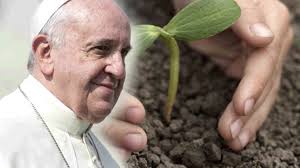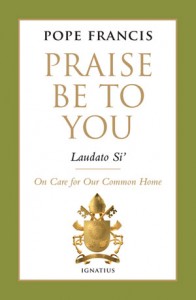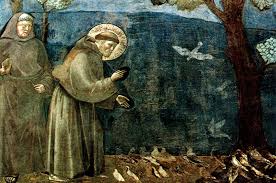We know that the whole creation has been groaning in labor pains until now; and not only the creation, but we ourselves, who have the first fruits of the Spirit, groan inwardly while we wait for adoption, the redemption of our bodies. [Romans 8:22-23, NRSV]
In his latest encyclical, Laudato Si’: On Care for Our Common Home, dated 24 May but officially released on 18 June 2015, Pope Francis writes prayerfully and comprehensively about the current state of mother earth. He makes an urgent plea for the people of the whole world to work together earnestly to improve the environment which is our common home.
Before embarking on any level of analysis of the text, it seems well worth our while to take a step back and briefly look at four persons, amongst others, from whom the Pope draws spiritual inspiration. Readers of the encyclical can no doubt discern their influence in the document.
1. John the Baptiser
From this prophet who was Jesus’ first herald, Pope Francis learned two things: to speak courageously; to call for repentance. Today, Pope Francis is recognised worldwide as the leading voice for the Good News of Christ whom, Scriptures attest, stands at the origin of creation [see Colossians 1:16-17; John 1:10; Hebrews 1:1-2].
John the Baptiser courageously spoke truth to power, calling people in authority to account. He would die for that, of course [see Matthew 14:1-12].
Mark the Evangelist in the opening chapter of his gospel paints for us a graphic picture of this “wild” man. Poor in fashion-sense, he was clothed in camel skin; badly in need of dietary tips, he ate locusts and drank wild honey. But, all this was kind of stage-prop for a stunning entrance by the Baptiser. As Mark in the very opening scene employs the prophet Isaiah to launch John the Baptiser onto the stage as “the voice of one crying in the wilderness: Prepare the way of the Lord, make his paths straight”, he follows it through by describing the Baptiser as having the unique practice of “preaching a baptism of repentance for the forgiveness of sins” [Mark 1:2-8].
The first words Jesus speaks in the Gospel of Mark, and that is immediately upon exiting from the wilderness after warding off Satan’s temptations, are: “The time is fulfilled, and the kingdom of God is close at hand; repent, and believe in the good news” [Mark 1:15].
From the inception of his papacy, Pope Francis has been calling the Church and her faithful, beginning with the bishops and the priests, to change, change and change. “Do not be conformed to this world, but be transformed by the renewing of your minds, so that you may discern what is the will of God – what is good and acceptable and perfect” [Romans 12:2]. Now, he speaks truthfully to all, calling to account the immense harm inflicted on the environment by the irresponsible and sinful actions of all – from gross neglect on the part of the developed and the ferociously developing countries, through the wanton extractive activities of profit-driven multi-national companies, down to the consumerist throwaway culture and attitude in contemporary societies, and passive individual conscience.
Repentance, however, is not primarily in feeling guilty about our sins, or in doing penance. The biblical meaning of repenting is fundamentally two-fold: first, to “return” to God, to “reconnect” with God; second, to “go beyond the mind that we have”. Of essence, is to change our minds that have previously been shaped by unthinking behavior and habits which might even qualify as blind “tradition” or bad “culture”. What is urgently needed is reflection, serious reflection, so that the whole world may come to acknowledge the human causes to the pressing environmental crisis and begin seriously to come together to take remedial actions, for the good of God’s creation and our common home.
To degrade creation is to sin against the Creator and ultimately to sin against ourselves [n.7]. Hence Pope Francis speaks with urgency of a collective ecological conversion to repair the lost harmony. And as he incessantly calls for reform and renewal, Pope Francis aims for changes that are wide and deep, in mentality and attitude, in structures and systems, and in habits and lifestyle. The bottom line for Pope Francis in an integral ecological vision is always this: How do we relate to people? He writes an encyclical, not a policy paper for a rogue state, a profit-crazy company or even an NGO. He recognizes that the ecological crisis is spiritual in nature, and so must be its cure. He urges real reform, which always requires digging down to the roots of the problem, and those roots lay buried in our hearts. He wants to see a revolution of the heart.
What we have here will become recurrent motifs in the encyclical.
2. Saint Francis of Assisi [1181-1226]
The spirit of St Francis of Assisi is at the core of this current pontificate. On 13 March 2013, upon his election as Pope, Cardinal Bergoglio chose Francis as his papal name, the first time a pope has done so. At his first audience on 16 March 2013, Pope Francis told journalists that he had chosen the name in honour of Saint Francis of Assisi, and had done so because he was especially concerned for the well-being of the poor. Bergoglio had previously expressed his admiration for St. Francis on account of whose life witness, the Church, and indeed Christianity, has better understood Christ’s message of poverty against the luxury, pride and vanity of the civil and ecclesiastical powers from his time on.
Saint Francis is far and away the main source of inspiration for the Pope on ecology. To him, the 13th century saint is the quintessential example of comprehensive care for the ecology, who showed special concern for the poor and the abandoned [see n.10]. His own lengthy pastoral immersion in the Latin American Sitz im Leben has bonded him tightly to the twin elements of the famous Latin American call to pastoral conversion, namely, opening one’s heart to hear the messages of Jesus in the Gospels and the cries of the Poor, and opening one’s door to actively reach out to the Poor. Politically and theologically, Pope Francis’ starting point will always be a preferential option for and solidarity with the poor.
From Saint Francis, the Pope learns about integral ecology. With Saint Bonaventure, he sees that “through universal reconciliation with every creature, Saint Francis in some way returned to the state of original innocence. This is a far cry from our situation today, where sin is manifest in all its destructive power in wars, the various forms of violence and abuse, the abandonment of the most vulnerable, and attacks on nature” [n.66].
The title of the Pope’s encyclical Laudato Si’ is taken from the opening lines of Saint Francis’ Canticle of the Creatures (also known as Canticle of the Sun). Evidently, the saint was one deeply in touch with the beauty and dignity of creation. Here is also a “small” departure from tradition, in that instead of the usual Latin title, this encyclical uses Italian. That, of course, is not surprising since St Francis’ canticle was in Umbrian Italian, Assisi being located in the region of Umbria.
The spiritual inspiration of the saint that lives in the pope is clearly manifest in three areas and these run right through the encyclical, namely, love and respect for God’s creation and all its creatures, care and compassion for the poor, and a disciplined, simple, and even ascetic lifestyle. Underneath all that lies something that falls beyond the obvious but which is laden with spirituality. To be of any use to any body, the speaker or the writer, the theologian or the spiritual guide, must be in love with God and surrender themselves to God. In constant prayer and praise, they do their work best on their knees. We will find Pope Francis beginning his text with one and rounding it up with two prayers. It is no surprise to learn from Cardinal Peter Turkson, President of the Pontifical Council for Justice and Peace who officially launched Laudato Si’ at a press conference, that the purpose for which the Pope wrote this encyclical was to link human and natural ecology based on a contemplative, prayerful attitude towards creation. At the soul of the encyclical, therefore, rests a deep spirituality. It is a spirituality that offers a challenging message on how we should measure progress in human societies. What is the goal of our work and our labour?
The tender and fraternal spirit of St. Francis of Assisi will illuminate the entire text of the encyclical.
3. Romano Guardini [1885-1968]
Guardini was an Italian-born, German-raised theologian and priest whose works influenced the Second Vatican Council as well as St. John Paul II and, particularly, Benedict XVI and Pope Francis. In the 1980s Bergoglio began work on a doctoral dissertation on Guardini, though the decision to take a doctorate was later abandoned for other reasons. Guardini’s influence may be seen on every page of the encyclical. His work “The End of the Modern World” in particular is cited eight times in Laudato si’, and thus constitutes the proper context for our reading the text.
In his work, Guardini has highlighted a distinctly modern sensibility that began with Francis Bacon and René Descartes, who both saw nature as something to be conquered and appropriated. The typically modern human person relished in scientific discoveries, utilizing them in a manner that was both aggressive and self-absorbed, converting the natural world into simply materials to be manipulated for his own purposes. In a word, the modern man treated nature not with respect but with disdain. This modern anthropocentric drive has led to a colossal anthropological error, which shows itself in a misunderstanding of what it means to be a human person, and in the four alienations – with self, others, nature, and God – sins that cry out for reconciliation. The spirit of modernity had in a devastating way caused the eclipse of faith in creation. In this regard, Pope Francis will stress the catastrophic consequences to the ecology as unthinking human contempt for the materials in creation rather than a much-needed attitude of conscious gratitude for the gifts in creation. But he will do so by placing the blame squarely on the modern utilitalian mentality of treating nature as a given rather than a gift, while vehemently defending the positive Scripture-based Christian doctrine on creation. There, humanity as mere stewards and care takers, and never as owners, is commanded to “keep and till the land” in accordance with the will of the Creator-God [Genesis 2:15].
That is why Pope Francis sees it crystal clearly that the nature humanity has attempted to dominate over the past several centuries, has now turned on us, like Frankenstein’s monster. We are already paying for the reigning throwaway culture, not to mention the hardships of the poor, and the plight of future generations. The two paths, “life and death, blessings and curses” [Deuteronomy 30:19], are set out before us. Pope Francis’ “groan” for creation will be a provocative reminder to humanity that we will either emerge from the ordeal of modernity with our faith renewed, or we will not emerge at all.
4. Leonardo Boff
Leonardo Boff, a former Franciscan Friar, is a Brazilian liberation theology-professor who has done extensive work on ecology. He draws on the general ecology of Félix Guattari and the integral ecology proposed by the cultural historian Thomas Berry. Reports have it that soon after his election to the papacy, Pope Francis privately got in touch with Boff and asked for all his writings on eco-theology in preparation for a major encyclical the Pope was considering on environmental matters.
Condemned to ‘obsequious silence’ and suspended from his religious duties by the Congregation of the Doctrine of the Faith for his theology, Boff in 1992 was driven to resign from his priesthood during the previous papacy. He has of course officially been a persona non-grata at the Vatican ever since. Yet, while Boff’s name is not mentioned in Laudato Si’ which quotes extensively from the two previous popes, it is clear that Pope Francis worked with the integral ecology articulated by Boff. The encyclical contains many references to “integral ecology,” including an entire chapter by that title. There is an allusion to Boff’s 1997 Cry of the Earth, Cry of the Poor when the Pope writes: “Today, however, we have to realize that a true ecological approach always becomes a social approach; it must integrate questions of justice in debates on the environment, so as to hear both the cry of the earth and the cry of the poor” [n.49].
Of particular interest to us is the extent this encyclical has impacted creation theology, even though it is only pastoral in orientation and is classified under Catholic Social Teaching. Boff, putting his Franciscan spirituality of ecological sensibility to good use in his eco-theology articulation, has insisted on proper recognition of the rights of all of creation as having been created by the same Creator. All animate beings and non-animate-things are endowed with intrinsic values, capable of reflecting the goodness and beauty of the Creator. They are worthy of care and respect. They are placed by the Creator on this planet as part of the eco-system, not for plunder and abuse. In a 1993 work translated as Ecology and Liberation, Boff takes up a holistic ecological model, arguing that social ecology and social justice are intricately related. This is reflected in the theme of the “inter-relatedness of all things” that permeates and undergirds the entire encyclical. In the field of creation theology, the impact of all this should be seen clearly in three steps: first, it is a clear rejection of the theology of “human dominion over the earth” model; second, it clearly moves beyond the theology of “stewardship” model; and third, identifiable as a third wave in ecological consciousness, Laudato Si’ now stresses the intrinsic worth of all of creation [“brother sun”, “sister moon”, and “mother–sister earth”], and proposes a fresh appreciation of the Creator’s command “to keep and till”, honouring God by honouring His creation.
The Holy Father sees the risk of passively accepting certain behaviours and to not be astonished by the sad situations around us. We must change course. Humanity needs to repent and turnaround, to convert to the Creator-God so we can better deal with the many evils that we see. There is no time to waste; we need to get moving now. Ecological conversion is a moral imperative. Repent and change.
Copyright © Dr. Jeffrey & Angie Goh, August 2015. All rights reserved.
You are most welcome to respond to this post. Email your comments to jeffangiegoh@gmail.com. You can also be dialogue partners in this Ephphatha Coffee-Corner Ministry by sending us questions for discussion.



